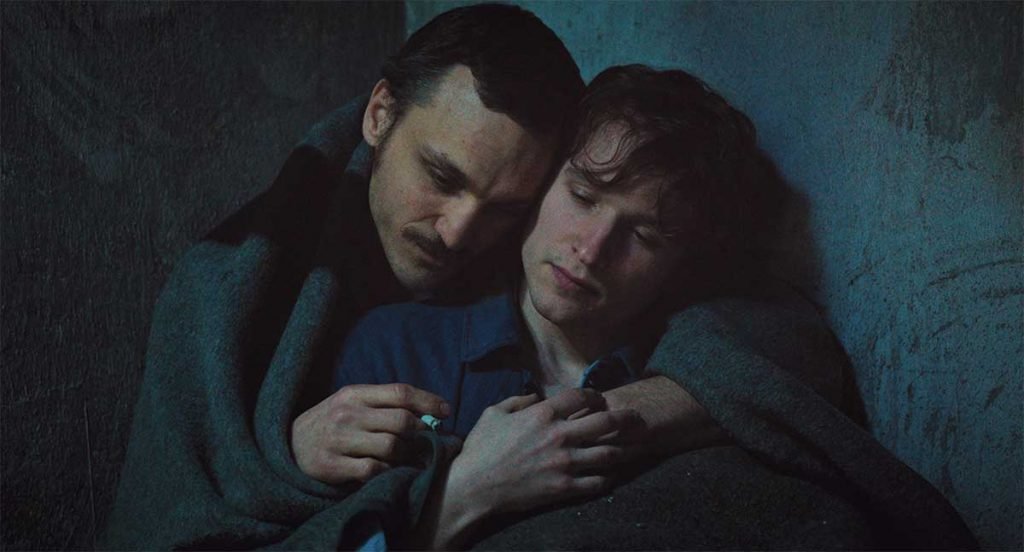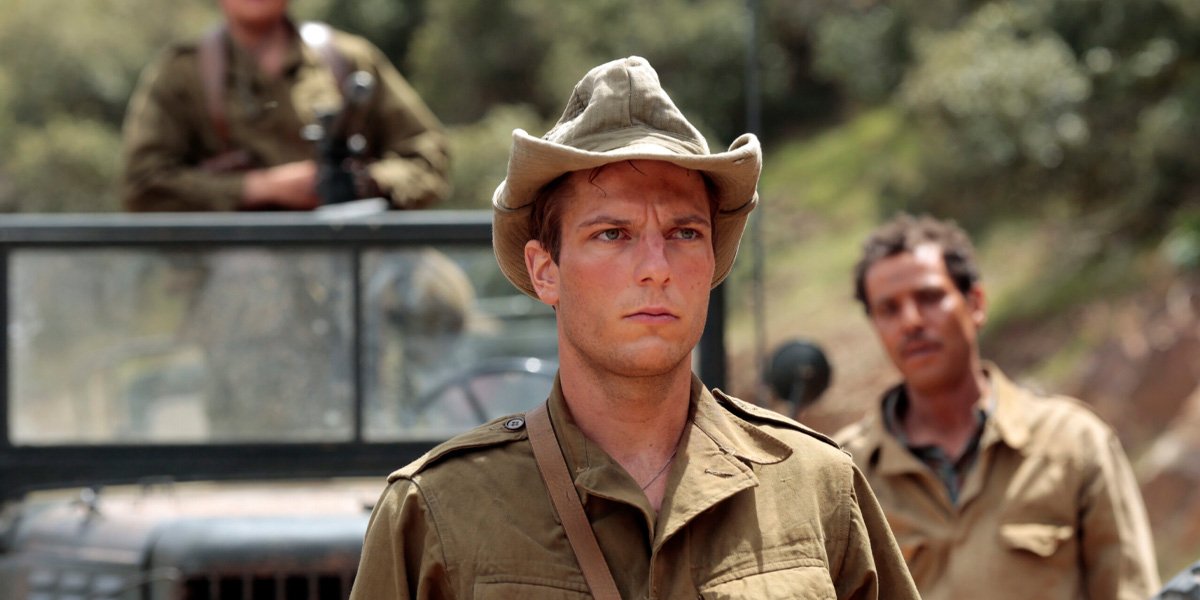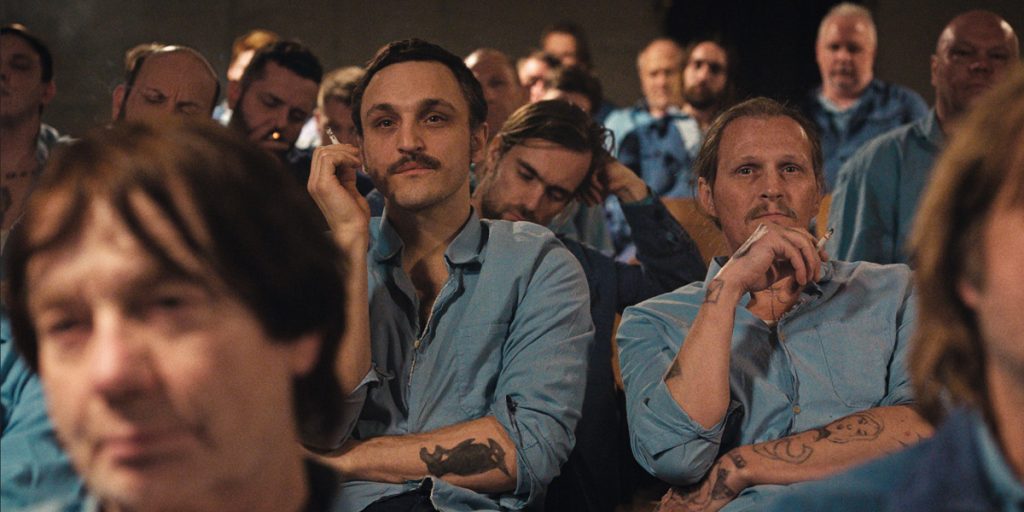Great Freedom chronicles the life of a homosexual man in Germany during a time when it was illegal to be gay through a love story that unfolds in prison.
Director Sebastian Meise’s Great Freedom tells the story of Hans (Franz Rogowski), a gay man in post-war Germany. Treated as a criminal offence due to paragraph 175 in the Constitution, his homosexuality becomes the reason he frequents prison over the years. Three such stints, in 1945, 1957, and 1968, are covered in the film. Over the years in prison, he befriends Viktor (Georg Friedrich), an initially apprehensive straight man. The first time he learned why Hans was in prison, back in ’45, Victor had tried to shove Hans out of their shared cell. Viktor gradually softens up to him, and eventually they share an almost 25 year long friendship in gaps, every time Hans goes back to prison after being caught. Hans’ sentencing in ’68 is where the film begins.
Without context, after a few opening credits, the film starts with a video collage of Hans performing sexual acts on different men in a bathroom. The scenes are alternated with more opening credits. After about five such scenes, it’s revealed that this is a slideshow of sorts from a projector, whose sound could be heard while the montage played on the wall of a courtroom. After it’s shown to a Judiciary bench, the Judge sentences Hans to 24 months imprisonment, and then the film essentially dives into the central narrative.
Upon further reading, I learned that while Great Freedom’s protagonist is a fictional person, the context is far from fictional. In Germany, before 1969, homosexuality was a criminal offence, indoctrinated in the legal clause known as Paragraph 175. In fact, homosexuals did not get the freedom everyone else did when World War II ended, and all confirmed gay individuals were sent to prison directly from concentration camps to live out the remainder of their sentence beyond the days spent in the camps. And right from then, the law enforcement ensured imprisonment of all homosexually active gay men with strict rigour by all means necessary. The means included installing cameras behind mirrors in public restrooms to catch men in the act, because that’s where they felt they had privacy and were more likely to indulge themselves. The projection montage with which the film opens is possibly made of footage collected from one such camera – it’s never really clarified where the evidence came from.
Though the montage is used as a means to seal Hans’ fate, it essentially feels like a rebellious celebration of homosexuality. Yes, gay men are being hunted and prosecuted, but inside that room, which they don’t know is under surveillance, they’re are unapologetically themselves. If being who you are is criminalized, then the bravest form of rebellion is to be yourself. And even if these men are all feeling safe in the closed space, that opening montage insinuates the rebellious nature of the protagonist. He’s shown to be the initiator, for that matter. Hans is unwilling to bend to the systemic oppression of the gays. He may not be an outspoken leader inciting revolution, but he’s not afraid to express his sexuality just because he’ll be persecuted for it. He takes great risks, like disobeying orders and having to sleep outside his cell in the cold, just to be with the men he loves.
Great Freedom is a tale of bravery and love. While hope is shown to be the strongest of motivations in The Shawshank Redemption, arguably the most famous film set in prison, here it’s love. No matter who is imprisoned, who dies, and who loses, love triumphs. Hans is sent to prison because the world is afraid of his love, and so it’s in prison that he finds his love. His bond with Viktor knows no bounds. He helped out Hans once back in 1945 after spending time with him and realizing he was just a man, and his identity was in no way something to criminalize or monstrous or filthy. And ever since, whether they’ve ended up in the same cell or not, they’ve found each other whenever Hans has come back to prison. Imprisoned for life, Viktor is always there whenever Hans returns.
Hans’ returning to prison is clearly a result of his rebellious nature. His very existence is seen as a rebellion by a law which considers homosexuality to be offensive, but on top of that, he isn’t interested in complying to prevent facing the same fate once every few years outside. He is a deeply passionate man, unwilling to submit to such an inhuman demand as set forth by paragraph 175. The consequences on others of such a stance aren’t necessarily easy to take, and even his evolution with respect to that can be seen. A particularly devastating event in 1957 causes him to go out of his way in ’68 for another inmate. So while he is very clear about his mission of not giving in, he’s respectful of others’ choices, although it’s after he once pushed too far.
And maybe his return to jail isn’t as simple as that either. Viktor’s companionship is truly a comfort zone for him. Possibly because Viktor grew to accept Hans for who he is, despite initially dismissing him, their bond is very deep. It makes sense that they can pick up where they left off, because it’s beyond the superficial that they feel connected. To quote the overused, possibly cliché proverb, “a friend in need is a friend indeed.” Both have been there when the other needed someone, and this is why years of not seeing each other, and not really knowing each other, never create any real distance between them. The very last scene of Great Freedom is a heartbreaking ode to the power of their love, and it acknowledges the power of finding a friend when in dire straits. I’d say this is a love story at its core, more than anything else. Of course the social commentary, provided primarily through Hans and his fellow gay inmates’ discussions about imprisonment and life outside jail, and the portrayal of prison life, like depicting the harsh attitudes of wardens toward the inmates, or the condition of the solitary confinement rooms, reflects the meticulous research that went into making the film, but it’s the celebration of love set in a hopeless time that leaves a mark on the mind.
The non-linearity in the narrative is beautifully handled through visual cues. For example, Hans is shown to end up in solitary confinement in 1968, but he emerges from it in 1945. That is to say, while he sits there in the dark, the story shifts to the past, and when the door opens to let light in, we see a much younger Hans step out, followed by a mention of the year that clarifies that the narration will be non-linear. Screenwriters Thomas Reider and Sebastian Meise have intricately woven an extended and complicated narrative, shuffling between timelines during parallel story threads, like the solitary confinement just mentioned. The screenplay is intimate with its central theme, meandering in scenes of passion, just depicting the soft warmth beyond the sex. Hans slowly caressing another man’s face in the yard, where they’ve been sent to for the night for disobeying orders, is an ideal example of this.
And speaking of writing intimacy, the lack of dialogue in general is also a powerful narrative tool in Great Freedom. The conversation is minimally functional, merely there for information exchange and exposition. Especially on the part of Hans. Viktor has outbursts and speaks a lot, especially in the bits from the past, but Hans is a man of few words. He’s the ideal protagonist for a personal observational story, because meandering through narrative threads, depicting a certain reality with a focus on passion and the cruel conditions in prison is best done through a man who notices and feels rather than someone who passes comments on everything he witnesses. It keeps the focus on Hans and his experiences, as the viewer essentially merges with his mind instead of being drawn in by his words.
Crystel Fournier’s cinematography is a primary contributing factor to the film’s ability to appeal to everyone on a personal level. Since Hans barely speaks, and it’s primarily in the reactions and emotions on his face and in his body language that we connect with him, it’s essential that he’s presented in a personable manner. The intricacies of the cinematography would take up pages to discuss, because the perfect balance of handheld, still, tracking and other techniques, make for a visual treat. It’s because of the way the camera frames Hans, be it in moments of emotional vulnerability or in moments of casual observation, that we’re able to feel all that’s left purposefully unsaid. I really enjoyed the lack of dialogue, because the silence helps absorb the general vibe of the person, and while the setting is an embodiment of tragedy, the power of love washed over me through the lack of noise.

Speaking of making Hans personable, any discussion on Great Freedom would be incomplete without appreciating Franz Rogowski’s superior performance. It’s so composed that he touched the deepest corners of my emotional core with his nuanced acting. The lack of explosive expression makes him feel very authentic, because it makes sense that, after years of living like he has, he’d be spiritually exhausted, and take things in his stride. The beautiful contrast with the more entitled persona of Hans’ youth speaks to Rogowski’s talent as an actor. The differences aren’t just in the more obvious rebellious nature, but also in the less noticeable quirks. He walked with less confidence in the past, but his smile hasn’t changed for example. The performance deserves a lot of critical acclaim in my opinion.
Georg Friedrich as Viktor is much less reserved. Why he’s imprisoned for life, isn’t mentioned till much later into the film, but once you learn the backstory, his performance also seems like a perfect depiction of the man he’s playing. Viktor is just as passionate as Hans, but his passion has an explosive quality to it. He wears his emotions on his sleeve, and emotes much more clearly. He’s not hard to read but that seems to hide a vulnerable core, and it’s because this nuance has come through that I feel Friedrich deserves as much acclaim as Rogowski. Also, their chemistry wasn’t natural, but developed over time, and their performances make it seem even more believable. There are clear behavioural distinctions in scenes with just one of the two like Viktor being less explosive and more reserved. The trust level is palpable from the way the actors hold each other when the characters hug, or the looks in their eyes when they’re communicating without words.
One tiny detail about the film piqued my interest almost instantaneously and that’s the use of music, specifically while Hans is in solitary confinement. To create an honest portrayal, there’s no score in these scenes. It’s just a black screen with sounds, and in one scene a little dialogue. However, whenever he lights a matchstick, there’s music that plays till the match goes out, which I interpret as an acknowledgement of the fire that burns inside Hans. In a dark room, he is sitting, intently staring at the matchstick after lighting a cigarette. In a world of darkness where his identity is an offence, he stares into eyes of men like him, as he expresses his true nature, letting the fire within burn for a few moments of pure passion before going back to the hopeless world. Without music, it would have been more observation, and this symbolism is effective because it makes the moment endearing.
Great Freedom is a true champion of its cause, telling a story that needed telling. The plight of homosexual men before their sexuality was decriminalized is truly devastating, and the film portrays it as such. However, it’s not just a pit of darkness which just explores the hopelessness, and it essentially speaks of the triumph of love, and speaks to the power of passionate soul in the context of surviving in a world that essentially hates you for who you are. A beautiful ode to the struggles of the men Hans represents, Great Freedom is possibly one of the best films to be made in 2021.
Great Freedom will open theatrically in New York on March 4, 2022 at Film Forum, followed by Los Angeles and a national expansion.

 loudandclearreviews.com
loudandclearreviews.com
